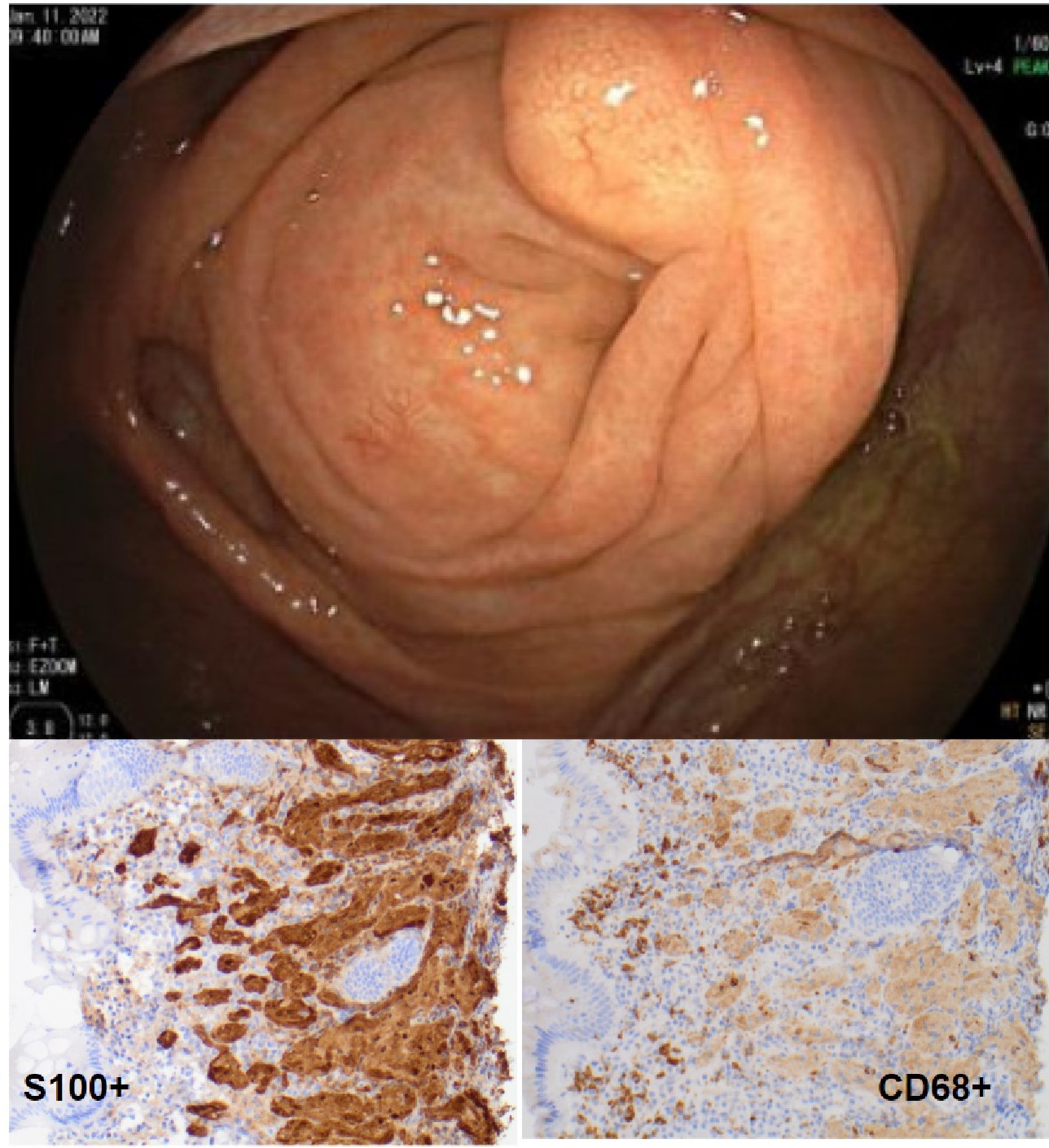Back
Poster Session E - Tuesday Afternoon
E0148 - Granular Cell Tumor of the Cecum: An Uncommon Tumor in an Unusual Location
Tuesday, October 25, 2022
3:00 PM – 5:00 PM ET
Location: Crown Ballroom
- RB
Roderick S. Brown, DO
University of South Alabama School of Medicine
Mobile, AL
Presenting Author(s)
Roderick S. Brown, DO1, William P. Sonnier, MD2
1University of South Alabama School of Medicine, Mobile, AL; 2University of South Alabama College of Medicine, Mobile, AL
Introduction: Granular cell tumors are rare soft tissue neoplasms derived from Schwann cells and are commonly found in the skin, oral cavity, and gastrointestinal tract. While most follow a benign course, malignant cases have been reported in 1-2% of cases. In the gastrointestinal tract, the majority of cases involve the esophagus but rarely these tumors will involve the colon. We present a case of a granular cell tumor of the cecum found incidentally in a middle aged woman during a screening colonoscopy.
Case Description/Methods: A 52 year old female presented for colon cancer screening. She used tobacco but had no past medical history. She denied a family history of colon cancer or colon polyps. Physical examination was normal. Colonoscopy revealed a 1 cm subepithelial, polypoid lesion in the cecum in close proximity to the appendiceal orifice. Biopsies revealed a proliferation of plump cells with bland nuclei and granular, eosinophilic cytoplasm in the lamina propria and submucosa. The cells were S100 and CD68 positive, consistent with a granular cell tumor. Due to subepithelial involvement she underwent laparoscopic appendectomy with en bloc wedge resection of cecum with negative margins.
Discussion: Gastrointestinal involvement of granular cell tumors account for 5-11% of all cases reported. In the gastrointestinal tract, the esophagus is the most frequently encountered location followed by the duodenum, anus, stomach, and colon. Less than 130 cases of colonic involvement have been reported. Most lesions are found incidentally on screening colonoscopy. While most tend to follow a benign course, malignant lesions have been reported. Management typically involves surgical resection due to subepithelial involvement or endoscopic submucosal dissection. This case highlights the importance of recognizing colonic involvement of a tumor that is typically considered to be a tumor of the esophagus. Endoscopists should consider granular cell colonic tumors when encountering subepithelial lesions of the colon.

Disclosures:
Roderick S. Brown, DO1, William P. Sonnier, MD2. E0148 - Granular Cell Tumor of the Cecum: An Uncommon Tumor in an Unusual Location, ACG 2022 Annual Scientific Meeting Abstracts. Charlotte, NC: American College of Gastroenterology.
1University of South Alabama School of Medicine, Mobile, AL; 2University of South Alabama College of Medicine, Mobile, AL
Introduction: Granular cell tumors are rare soft tissue neoplasms derived from Schwann cells and are commonly found in the skin, oral cavity, and gastrointestinal tract. While most follow a benign course, malignant cases have been reported in 1-2% of cases. In the gastrointestinal tract, the majority of cases involve the esophagus but rarely these tumors will involve the colon. We present a case of a granular cell tumor of the cecum found incidentally in a middle aged woman during a screening colonoscopy.
Case Description/Methods: A 52 year old female presented for colon cancer screening. She used tobacco but had no past medical history. She denied a family history of colon cancer or colon polyps. Physical examination was normal. Colonoscopy revealed a 1 cm subepithelial, polypoid lesion in the cecum in close proximity to the appendiceal orifice. Biopsies revealed a proliferation of plump cells with bland nuclei and granular, eosinophilic cytoplasm in the lamina propria and submucosa. The cells were S100 and CD68 positive, consistent with a granular cell tumor. Due to subepithelial involvement she underwent laparoscopic appendectomy with en bloc wedge resection of cecum with negative margins.
Discussion: Gastrointestinal involvement of granular cell tumors account for 5-11% of all cases reported. In the gastrointestinal tract, the esophagus is the most frequently encountered location followed by the duodenum, anus, stomach, and colon. Less than 130 cases of colonic involvement have been reported. Most lesions are found incidentally on screening colonoscopy. While most tend to follow a benign course, malignant lesions have been reported. Management typically involves surgical resection due to subepithelial involvement or endoscopic submucosal dissection. This case highlights the importance of recognizing colonic involvement of a tumor that is typically considered to be a tumor of the esophagus. Endoscopists should consider granular cell colonic tumors when encountering subepithelial lesions of the colon.

Figure: Endoscopic and microscopic images of Granular Cell Tumor
Disclosures:
Roderick Brown indicated no relevant financial relationships.
William Sonnier: Abbvie – Speakers Bureau.
Roderick S. Brown, DO1, William P. Sonnier, MD2. E0148 - Granular Cell Tumor of the Cecum: An Uncommon Tumor in an Unusual Location, ACG 2022 Annual Scientific Meeting Abstracts. Charlotte, NC: American College of Gastroenterology.

